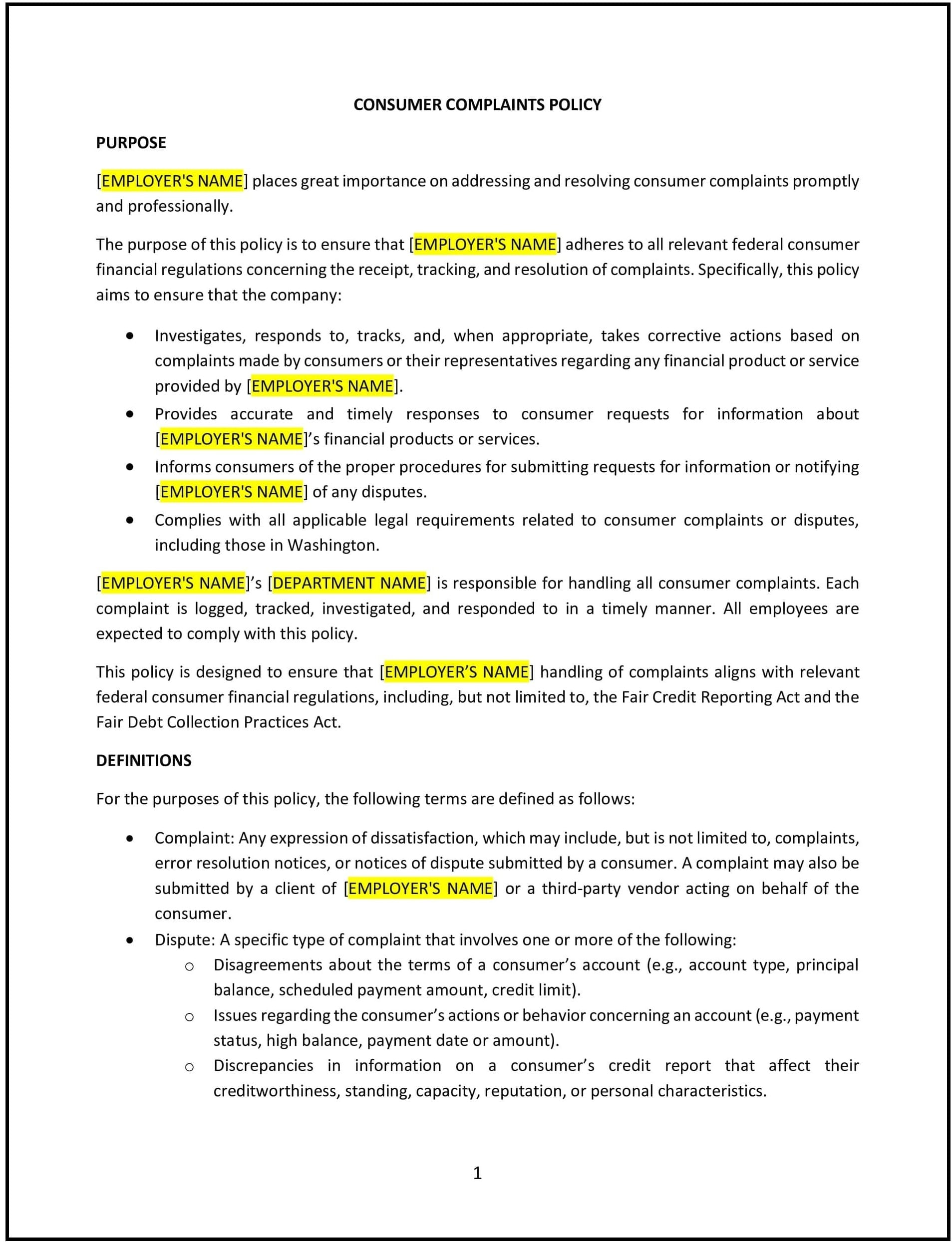Consumer complaints policy (Washington): Free template
Got contracts to review? While you're here for policies, let Cobrief make contract review effortless—start your free review now.

Customize this template for free
This consumer complaints policy is designed to help Washington businesses effectively manage and resolve consumer complaints in a timely and professional manner. The policy outlines the procedures for customers to file complaints, how these complaints will be handled, and the steps the company will take to address consumer concerns. It ensures that complaints are treated fairly, investigated thoroughly, and resolved in a way that promotes customer satisfaction and company integrity.
By adopting this policy, businesses can enhance their reputation, improve customer relations, and enhance compliance with Washington state and federal consumer protection laws.
How to use this consumer complaints policy (Washington)
- Define the complaint submission process: Clearly outline how customers can submit complaints, including the methods available (e.g., phone, email, online form). Specify what information customers should provide to ensure their complaint is properly documented and addressed.
- Set timelines for responses: The policy should establish clear timeframes for acknowledging receipt of complaints and resolving them. For example, the company may commit to acknowledging complaints within 48 hours and resolving them within 10 business days, depending on the complexity of the issue.
- Designate a responsible party: Specify who within the company is responsible for managing consumer complaints, such as a customer service manager, compliance officer, or designated complaint handler. This ensures accountability and ensures complaints are handled efficiently.
- Address how complaints will be investigated: Describe the process for investigating complaints, including gathering relevant information, contacting the customer for additional details, and assessing the nature of the complaint. The policy should ensure that all complaints are investigated in a thorough and impartial manner.
- Outline resolution procedures: Provide guidelines for resolving complaints, including offering refunds, replacements, repairs, or other appropriate remedies. The policy should also outline how the company will communicate the resolution to the consumer.
- Provide guidelines for handling repeat complaints: The policy should specify how the company will handle repeat complaints from the same customer or recurring issues that may indicate a systemic problem. This may include escalating the issue for further review or corrective action.
- Ensure compliance with Washington and federal laws: The policy must comply with Washington state consumer protection laws, such as the Washington Consumer Protection Act, as well as federal regulations that govern consumer rights and business practices.
- Review and update regularly: Periodically review and update the policy to ensure it remains compliant with Washington state laws, federal regulations, and any changes in the company’s operations or customer service practices.
Benefits of using this consumer complaints policy (Washington)
This policy offers several benefits for Washington businesses:
- Improves customer satisfaction: A well-managed complaint resolution process helps address consumer concerns quickly and effectively, leading to higher levels of customer satisfaction and loyalty.
- Strengthens company reputation: By demonstrating a commitment to resolving consumer complaints professionally and fairly, businesses enhance their reputation and build trust with customers.
- Reduces legal risks: The policy supports compliance with Washington state and federal consumer protection laws, reducing the risk of legal action due to unresolved complaints or unfair business practices.
- Promotes transparency and accountability: The policy fosters a culture of transparency, where consumers know how to report issues and trust that their complaints will be handled appropriately.
- Identifies areas for improvement: By tracking and analyzing complaints, businesses can identify recurring issues or patterns that indicate areas for operational improvement, allowing them to take corrective action before problems escalate.
- Protects business interests: The policy helps prevent minor issues from becoming major problems by addressing complaints in a timely manner, which can protect the business from reputational damage and financial loss.
Tips for using this consumer complaints policy (Washington)
- Communicate the policy clearly: Ensure that all employees are familiar with the consumer complaints policy and understand their role in handling customer concerns. Include the policy in the employee handbook, review it during onboarding, and provide regular training on how to handle complaints.
- Offer multiple complaint channels: Provide customers with several options for submitting complaints, including phone, email, and online forms, to ensure that they can easily reach the company with their concerns.
- Keep detailed records: Track all consumer complaints, including the nature of the complaint, how it was resolved, and the time taken to resolve it. Keeping accurate records will help identify trends and monitor the effectiveness of the complaint resolution process.
- Take prompt action: Ensure that complaints are addressed quickly and that customers are kept informed throughout the process. A prompt response shows that the company values consumer feedback and is committed to resolving issues.
- Implement corrective actions: If complaints reveal recurring issues or problems, take corrective actions to prevent similar complaints in the future. This may involve improving processes, training staff, or making changes to products or services.
- Review and update regularly: Periodically review the policy to ensure it remains compliant with Washington state laws, federal regulations, and any changes in the company’s operations. Regular reviews will help ensure the policy remains relevant and effective.